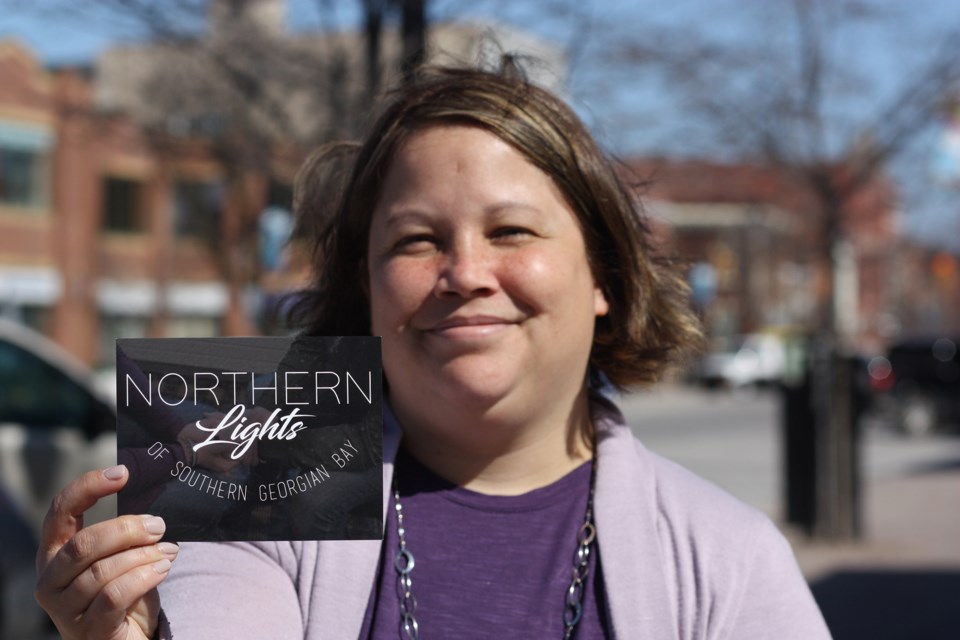Laura Rice is too familiar with cancer.
But she’s using her experience as intelligence in a post-treatment war on cancer.
Rice is the cofounder of a group called Northern Lights of South Georgian Bay. It is a women’s cancer support group led by Rice and other Canadian Cancer trained peer facilitators.
It’s not a therapy group, Rice clarifies.
It’s a group of women who have been or are going through cancer from diagnosis to treatment to remission and everything in between.
“Cancer is so isolating,” said Rice.
She has spent a lot of time in that dark room, surrounded but still alone.
Rice’s mom has had breast cancer twice. Three of four sisters have had cancer. Rice is a breast cancer survivor.
Many of the women in her family carry the mutated BRCA1 gene – the same as Angelina Jolie’s case that made headlines in 2013. Those who carry this mutated gene are up to 85 per cent more likely to get cancer in their lifetime. Typically the cancers related to this gene mutation are breast and ovarian.
Rice found out she carried the mutated gene in 2010, the same week she discovered she was pregnant with her first child – a daughter.
“It was a shock,” said Rice. When she found out her baby was a girl, a new fear developed.
“The idea of passing this mutated gene on to an unborn child … it was hard.”
During her pregnancy, she went in for “clinical surveillance” every three months. The exams had to be manual until she finished breastfeeding. After that, she went in for an MRI and a mammogram, but only got one in before she became pregnant again – this time with twin girls. She breastfed them for 11 months, and after 12 months, another MRI and mammogram revealed two tumours in her breast. She was diagnosed with stage three breast cancer in May 2015. She underwent chemotherapy, a double mastectomy and radiation treatment immediately, and finished all treatment by December, 2015.
“It’s very difficult to parent when you’re in a very dense fog caused by chemo,” said Rice. “Then there was the pain of the surgeries. You lose a little time with [your children]. You’re there, but you’re not there.”
Rice had several family members there for emotional support and help looking after her three girls. She was the first of her sisters to go through chemotherapy, but she was not the last.
Now in post treatment, she has committed herself to not only supporting those who are going through some form of cancer and related treatment, but also to finding a cure.
Her daughters may one day have to be tested for the mutated BRCA gene. They won’t be tested until they are in their mid-twenties.
“It’s a very life-changing diagnosis,” said Rice. “I want them to discover the beginning of their path first. I want them to date without this dark cloud over them … And I’m kind of hoping they’ll have a cure for everything by then.”
Rice’s life is forever changed by her many diagnoses.
“A lot of people don’t realize the severity of post-cancer fatigue,” said Rice. “I’m still not working full time.”
Rice gave up her job at the Canadian Ski Council. She now suffers from lymphedema, a result of some lymph nodes being removed during the mastectomy. It causes swelling in her arms and legs. She also suffers from neuropathy, caused by the toxicity of chemotherapy. Neuropathy is damage to the peripheral nerves; it causes weakness, numbness, and pain in the hands and feet.
Her body underwent severe trauma, and it isn’t the same anymore.
“People say breast cancer is the easiest cancer to get,” she said. “It’s not.”
Rice is watching her sister go through stage four breast cancer right now.
“You feel so helpless, and there’s not much I can do other than being there,” said Rice.
So Rice has declared her post-treatment war on cancer.
She is the run director for the local CIBC Run for the Cure event and she is a member of the Rethink Breast Cancer: Metastatic Breast Cancer Advisory Board.
As she went through her own cancer diagnosis and treatments, she used online forums for support and to gather information from others who had similar treatments to hers. But she realized that option doesn’t work for everyone and understood a need for some face-to-face interaction with others facing cancer.
“It’s important to know they are not alone,” said Rice.
That’s why she and Jane Walker decided to brighten those dark clouds and light up the dark, lonely room with Northern Lights. They both became certified peer facilitators through the Canadian Cancer Society, and created the local group in January 2017.
The name Northern Lights came from Rice, who decided the group needed a positive name without the word cancer in it.
The group meets every third Wednesday of each month from 1 to 2:30 p.m. at Paula’s Pantry in Collingwood, and is now starting an evening meeting beginning Thursday, May 3 and running the first Thursday of every month at the Lighthouse Integrated Care building via the back entrance (240 Erie Street) from 6 to 7:30 p.m. Women dealing with cancer – at any stage – are welcome to attend and there's no obligation for regular attendance.
For more information, contact Laura Rice via email or by phone at 705-532-5461.
